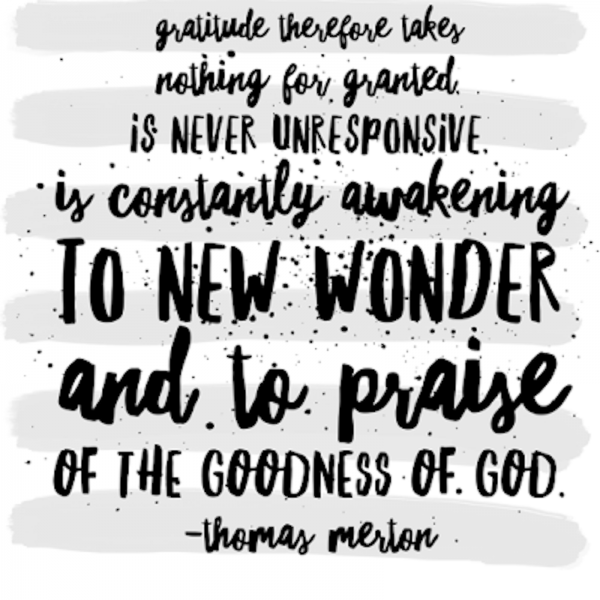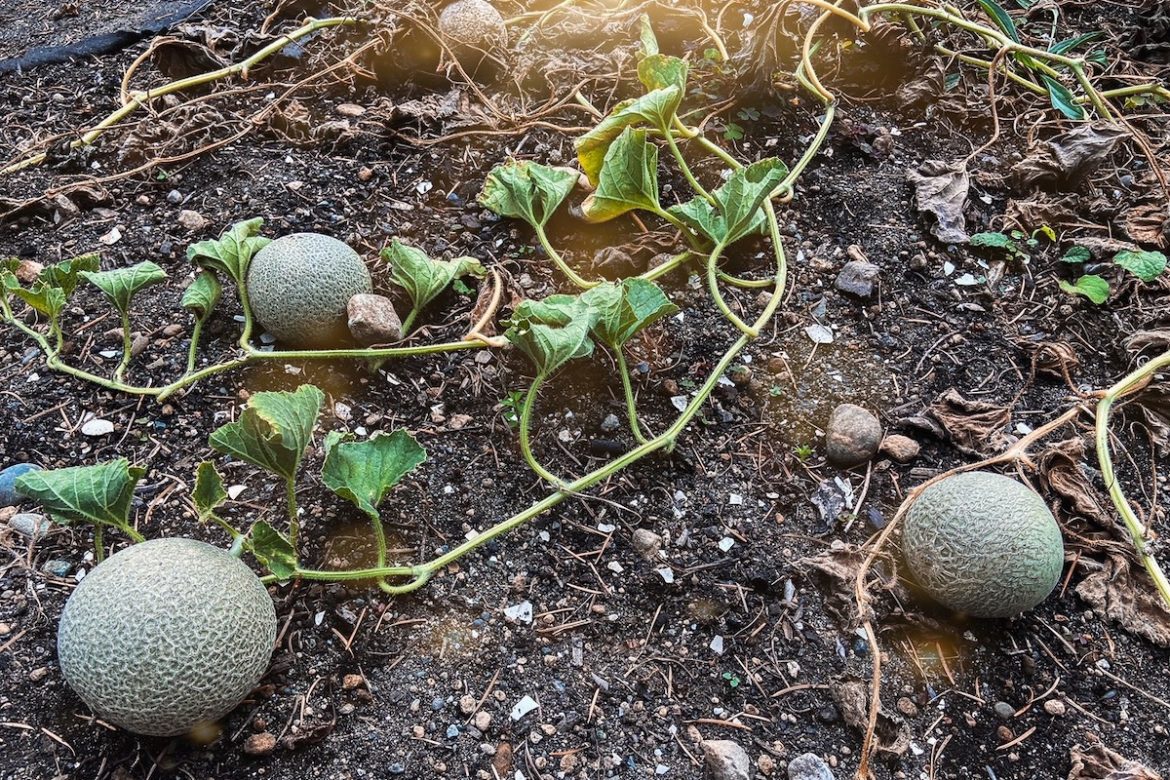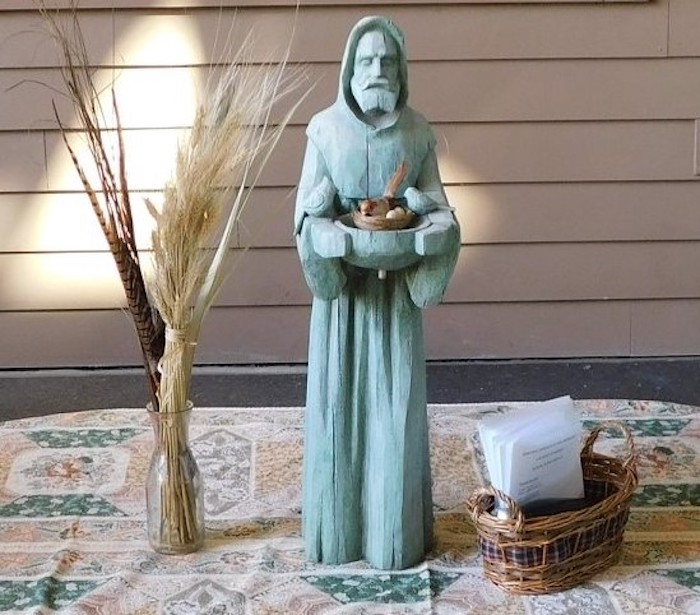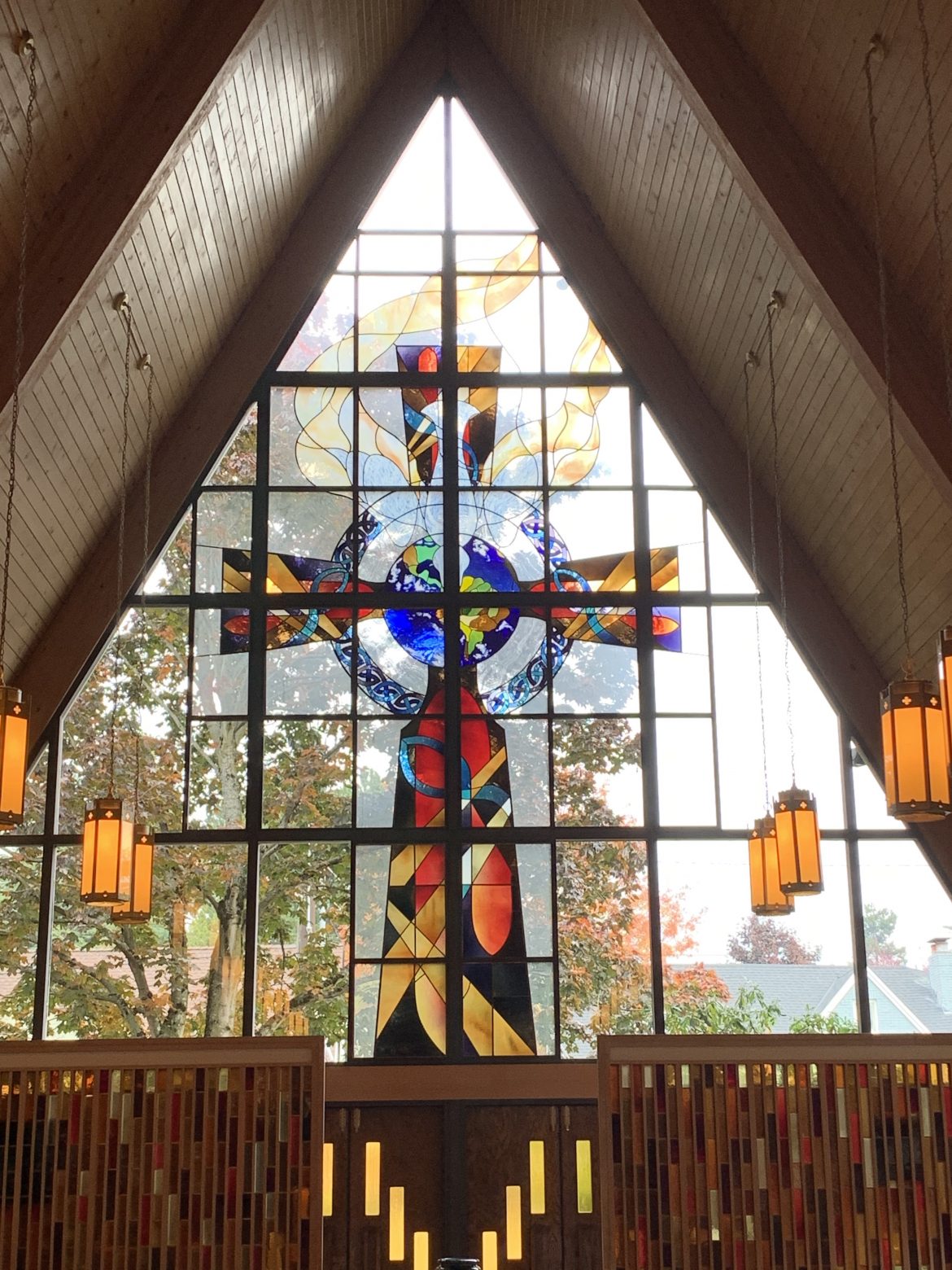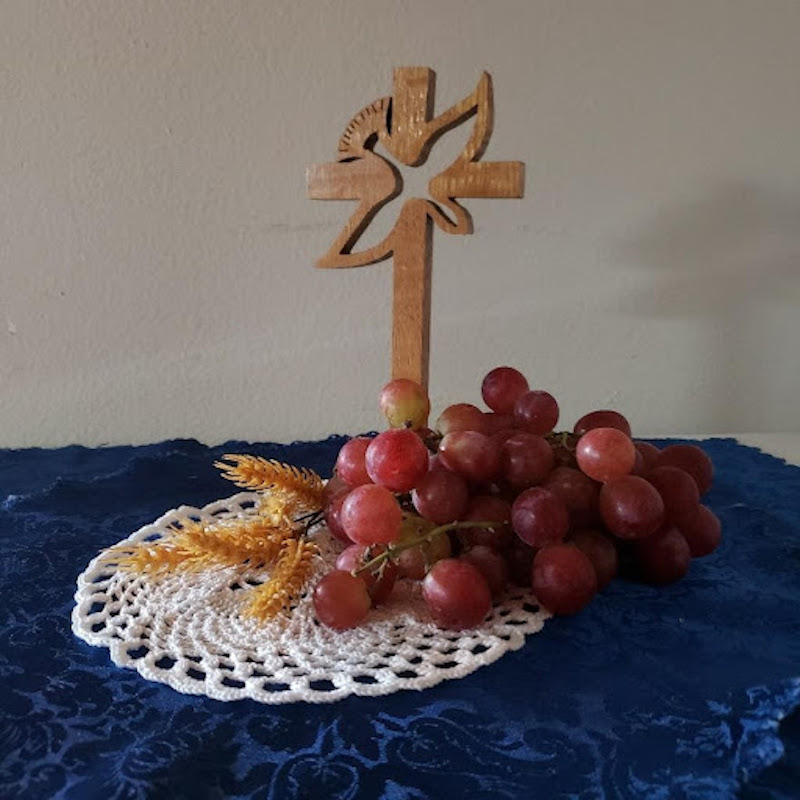by Emily Huff,
This is what our kids have to deal with having a mom who is a teacher.
Our family assignment every year around Thanksgiving is to write a letter about what we are grateful for and to share these letters around the table. While there might be some eyes that roll when I remind them of this exercise each year, I am convinced that this is such good work for us all to build these muscles and to practice giving thanks together. The notebook where we keep all these letters from years past also serves as a pretty sweet time capsule (as we started it in 1995), and we get some good laughs looking back through different reflections, drawings, and handwriting through the years.
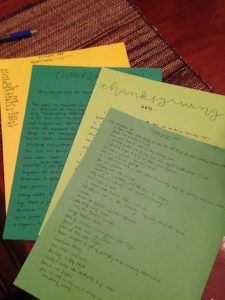
Thanksgiving Letters
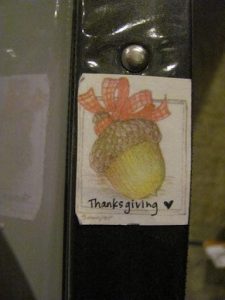
Our Thanksgiving Notebook
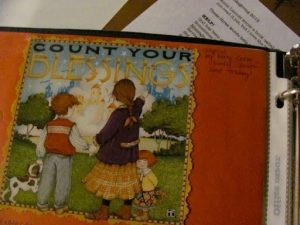
Notebook Page
When we have celebrated Thanksgiving at other family’s houses, we would not ask everyone to participate, and just the four of us in our immediate family would write letters and read them together later over the holiday weekend.
Over the last few years when we have hosted Thanksgiving at our house, we have invited those gathered with us to write a letter if they wanted to (making sure they understood that there was no pressure) to read around our table after our Thanksgiving feast.
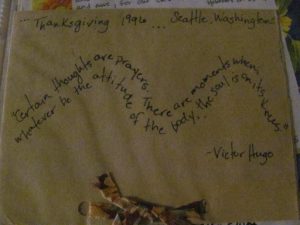
1996 Letter
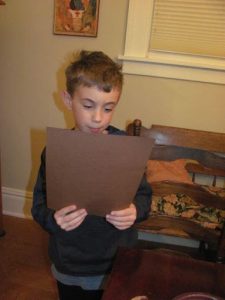
2012 Reading of the Thanksgiving Letter
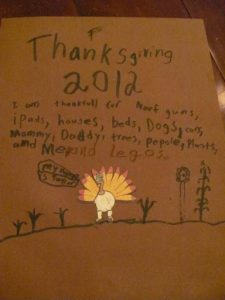
2012 Letter
This 2012 letter was from our son Taylor when he was 7 years old. I love that he added Legos after he realized that was not on his original list. 🙂
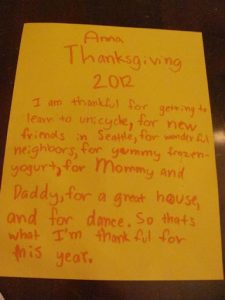
2012 Anna’s Letter at age 10

2017 Thanksgiving Reading
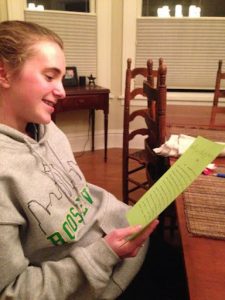
2017 Thanksgiving Reading
A few years ago, we invited a friend to join us for Thanksgiving during her sophomore year in college to be her home away from home, and we invited her to write a letter. I pulled out our notebook of Thanksgiving letters and was able to show her three letters from 1998 when we spent Thanksgiving with her and her family when she was just 2 1/2 years old. We were able to reminisce and read letters from her parents and see the list of things she had dictated to her mom 17 years ago. What a treat to have her add another one to our notebook so many years later! Milk and sunshine made the list back in ’98 so she made sure to put them on her list that year too. 🙂
This world dishes out plenty of things that can weigh us down so I believe it’s essential to carve out intentional time to focus on the good gifts we have been given and to cultivate gratitude together.
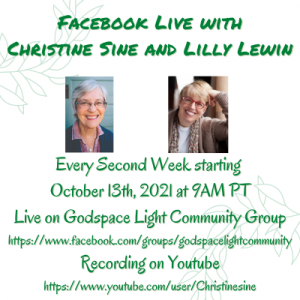 Join Christine and Lilly for the next session of Facebook Live on October 13th, 2021 at 9am PT. If you are not able to join live, you can check out the recording on YouTube later.
Join Christine and Lilly for the next session of Facebook Live on October 13th, 2021 at 9am PT. If you are not able to join live, you can check out the recording on YouTube later.
by Sara Easterly,
It made no sense. I’d done everything by the book—nurturing tiny seeds into starts, fertilizing the soil with rich compost and rabbit manure, watering regularly, pruning with love. I’d read countless gardening books, attended seminars through the local nursery, talked with master gardeners, studied what-to-plant-when charts, and, in my downtime, clicked through gardening apps on my phone. I even bought myself some overalls, hoping to channel the inner homesteader lying dormant in me. In other words, I worked to ensure I had control of everything in my garden.
But … by the end of the summer, which included a record-breaking heatwave, I was reminded that incredible effort does not always equal control. Sure, I got lucky with some lush basil and my garden yielded enough cucumbers to make five jars of pickles. But rodents ravaged the snow peas, a disease destroyed my green peppers, bugs besieged my parsley and kale, and crows capsized the corn. Pumpkins, cantaloupe, and tomatillos that once held great promise either withered or suffered from arrested development, unable to get the hydration needed to flourish during the hot, hot season.
While despairing over my gardening woes, I found comfort in scripture:
“Though the cherry trees don’t blossom
and the strawberries don’t ripenThough the apples are worm-eaten
And the wheat fields stunted,
Though the sheep pens are sheepless
And the cattle barns empty,
I’m singing joyful praise to God.”
—Habakkuk 3:17-19 (MSG)
I still think a little garden-grumbling was valid. I’m not a fan of toxic positivity and believe in the importance of expressing our frustrations and emotions, lest they build up. And … this reminder from Habakkuk gave me an opportunity to praise God for the many things that went well with my garden—with or without a tangible reward in hand.
For instance, there was the warm sun on my face all season long, the smell and feel of dirt on my hands, and the blessings of being outside. There were master gardeners and other green thumbs God has placed in my life, who were a pleasure to consult with and depend upon (when depending on others is a growth area for me). What about the rodents, bugs, and birds I inadvertently fed? I enjoy their company year-round … is it really so bad to share some of the summer harvest with them? Didn’t God design them to be foragers, and aren’t I asked to be a steward of the earth and all living things?
When I paused to reframe the situation through a lens of gratitude and praise, I didn’t feel that all was lost. In fact, had I thought I had it all under my complete control, I may not have even noticed such a bounty of blessings. How sad that would be—like my tomatillos, my own display of stunted growth.
In what areas of your life are you sensing a lack of control right now? What blessings can you root out when you let go of your own expectations and look for the gifts God is giving in the situation? How might you praise God?
Embark on this healing journey with Christine Sine, Lilly Lewin, and Bethany Dearborn Hiser with the Time to Heal Online Course. Each session is lead by one of our instructors and allows you 180 days of access for only $39.99. The goal of this course is to provide time, space, and tools to work toward healing.
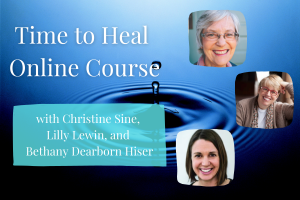
Yesterday was the feast day of St. Francis of Assisi. During the weekend, across denominational lines and throughout the world, his life and legacy were celebrated. Annual pet and animal blessings were held. St. Francis is so compelling that you can walk into a Lowe’s or a Walmart store, or any number of plant nurseries, and buy a statue of his likeness. Where do we see him most? In gardens and adorning birdbaths. There are numerous accounts of him preaching to birds.
Francis straddled the 12th and 13th centuries, dying in 1226. Born into a wealthy family, he was a wild youth fond of partying. He served in the military for a short time. While on the road it is said that he met a leper whose appearance had a profound effect on him. During that time, he fell sick, had dreams and visions, and experienced a conversion to Christ. Following a break with his father who disowned him, Francis renounced his father’s wealth. Taking off his clothes, he handed them to his father declaring his marriage to “Lady Poverty.”
What is often overlooked or forgotten about Francis is his total identification with poverty. For years he was homeless by choice, caring for street people who had not made that choice. He ministered to the sick, especially lepers. Perhaps we need to be planting statues of Francis in places where the urban poor are. Statues of Francis placed near soup kitchens and homeless shelters would remind us of his identification not just with animals but with “the least of these.”
Francis, like Jesus, cared about reforming and mending a broken world. One biographer says of St. Francis, “His life and his relationship with the world – including animals, the elements, the poor and sick, as well as princes and prelates, women as well as men, represented the breakthrough of a new model of human and cosmic community.” (Richard Rohr)
A new model of human community and cosmic community. Such a vision might be called God’s shalom. Theologian Walter Bruggeman says that shalom is the central vision of the Bible in which “all of creation is one, every creature in community with every other, living in harmony and security toward the joy and well-being of every other creature.” To care about the well-being of every other creature was at the heart of the vision of St. Francis of Assisi.
Murray Bodo wrote a spiritual and imaginative biography of Francis and said this, “God was everywhere and God’s presence charged creation with a power and glory that made everything shine with beauty and goodness in Francis’ eyes.” (The Journey and the Dream.)
For Francis, the Earth was alive. And the earth is alive. It is a community of life dependent on other life forms for existence. All living organisms on the planet breathe, inhale and exhale the same air. We share the other elements of water, earth, and fire. The Earth does not belong to us, we belong to it.
I think if Francis was among us today, his central message would be one of repentance. He would remind us to think and walk in a new direction, letting go of the idea that humanity is higher, greater, and more valued than or separate from the rest of creation. He would remind us that not only is creation good; it is sacred because it is a manifestation of God. He would invite us to better care for God’s beautiful creation, this Earth, our fragile island home.
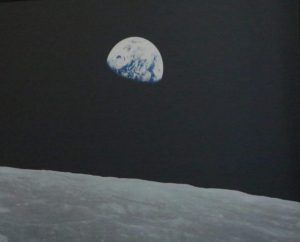
Earthrise
“Earthrise,” the first known picture of the Earth from the vantage point of the moon, was taken by astronaut William Anders on the Apollo 8 mission in 1968. We now have the ability with our own eyes to see a world without borders, a radiant but vulnerable gem floating in space. Yet, without the ability to view the Earth from this perspective, Francis had a cosmic awareness of the inter-dependence, the “Oneness” of all living things.
Although the feast day to celebrate the life of Francis has come and gone; his vision remains. There is always time to honor his legacy by a mindful practice of seeing life through his eyes. Consider contemplating the sacredness and wonders of our cosmos, the galaxies, stars, and the planets. Spend time with each of the elements, plants and animals. Give thanks for the ways they nurture and care for us. Practice listening to the Earth, and seeing God in creation and in all of humanity. I close with this prayer as I can imagine Francis reciting it.
“Earth-maker God, as the hand is made for holding and the eye for seeing, you have fashioned us for joy. Grant us your vision that we may find it everywhere— in the sunlit faces of our world, in the wild flower’s beauty, in the lark’s melody, in a child’s smile, in a mother’s love, in the face of a steadfast man. Our society is ever restless always craving one more thing to do, seeking happiness through more and more possessions. Teach us to be at peace with what we have, to embrace what we have been given and received, to know that enough is enough until our striving ceases and we rest content in you alone.”
Amen.
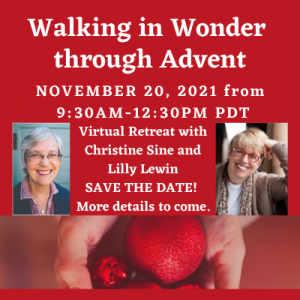 Come walk with us in Wonder through the Advent season. Join Christine and Lilly for a virtual retreat on November 20th, 2021 from 9:30 am-12:30 pm PDT. Save the date and watch this space for more details to come!
Come walk with us in Wonder through the Advent season. Join Christine and Lilly for a virtual retreat on November 20th, 2021 from 9:30 am-12:30 pm PDT. Save the date and watch this space for more details to come!
by Lisa DeRosa,
We are pleased to announce and introduce the journal that is used in conjunction with the Lean Towards the Light this Advent & Christmas devotional that we published last year and updated for this year. The journal is a great tool to use with the devotional. Each day has a reading of either a liturgy, reflection, poem, or prayer that correlates with the journal which includes scripture, questions, and suggested activities.
There are many ways to experience these resources that we are offering for the season of Advent. For example, we are offering the Advent devotional and journal as a bundle pack (available as a download) as well as bundled with the Advent Prayer Cards (as a download too). The Advent Prayer Cards are sold as 1 set, 3 sets, or downloadable PDF.
 Come walk with us in Wonder through the Advent season. Join Christine and Lilly for a virtual retreat on November 20th, 2021 from 9:30 am-12:30 pm PDT. Save the date and watch this space for more details to come!
Come walk with us in Wonder through the Advent season. Join Christine and Lilly for a virtual retreat on November 20th, 2021 from 9:30 am-12:30 pm PDT. Save the date and watch this space for more details to come!
by Christine Sine
Another week enamoured of my new morning mantra:
Thank God for the gift of life, this wondrous gift so freely given.
This week my focus was on the gift of breath, so intimately interwoven with the gift of life. This is a recurrent theme for me, but I have never felt so deeply moved by my meditations. Breath is the first gift God ever gives us, and the last. It is the gift that is given every moment of every day over and over and over again. It is a gift given to every living organism. In some way, every single part of creation inhales and exhales. Yet we so easily take this incredible gift for granted. Though perhaps one of the lessons we learned from COVID is not to take our breath for granted.
So today I sit looking at the prayer above, which I also have printed on a canvas board, and thinking about my breath and the wonder of a God who reached down into the soil, molded it into the shape we call human, breathed on it and formed that first human being. (Genesis 2:7 The Voice) Then I fast forward to the New Testament and imagine myself as one of Jesus’ disciples. I close my eyes and sense his warm breath as he moves close and breathes his spirit into me and says: “Welcome the Holy Spirit of the living God.” (John 20:21-22 The Voice)
Now I cup my hands and take a deep breath in through my nose and out into my hands. The warmth of it feels good against the chill of the morning air. I walk outside and repeat the process, imagining my breath moving out into the atmosphere laden with carbon dioxide that the trees in our back yard eagerly grab hold of, replenishing the air I exhaled with oxygen then sending it back to me or on to someone else. Wow, this act of breathing is far more wondrous and far more complex than I imagined. My breath is connected not just to the great Creator of the universe, it is connected to every other creature on our planet. God’s breath instills life into all creation. This wondrous gift of life and breath is truly incredible and I pray you will pause to think about it today.
I thank you God for the gift of breath,
First gift and last of my life,
A gift that fills me every moment of every day –
over and over and over again.
I thank you God for the wonder
of waking each day with breath in my lungs,
and your love in my heart.
I thank you for the breath you breathe,
On me, in me, through me.
Thank you for the gift you keep on giving
your life filling me each moment with love and mercy and joy.
(c) Christine Sine 2021
So much to give thanks to God for in every single breath of every day.
If you have time watch the video below and rejoice in the wonder of breath and of the God who continually gives us this wondrous gift.
You might also like to check out the series of breath cards I created a couple of years ago.
They are available as a downloadable pdf or as a set of cards
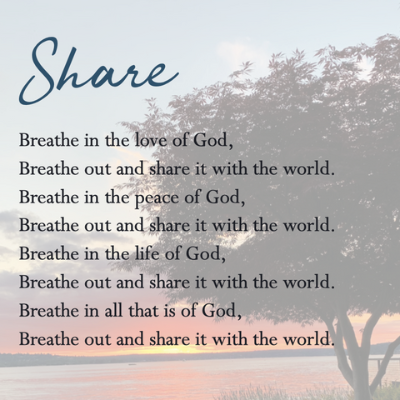
A contemplative service with music in the spirit of Taize. Carrie Grace Littauer, prayer leader, with music by Kester Limner and Andy Myers.
A contemplative service with music in the spirit of Taize. Carrie Grace Littauer, prayer leader, with music by Kester Limner and Andy Myers.
Permission to podcast/stream the music in this service obtained from One License with license #A-710-756 with additional notes below:
“La Ténèbre (Our Darkness),” “The Lord is My Light,” and “In the Lord” are songs from the ecumenical Taize community in France. Copyright and all rights reserved by GIA/Les Presses de Taizé.
“Kyrie” is an original composition. Music and lyrics by Kester Limner shared under the Creative Commons License, Attribution (CC-BY).
“When He Cometh (Jewels”)” is a public domain hymn, written in 1856 by William Orcutt Cushing, who was a Methodist minister and advocate for the education of blind children.
Thank you for praying with us! www.saintandrewsseattle.org
Writings and photos by June Friesen,
What comes to your mind as you hear the words ‘World Wide Communion’? I have to admit that it was not until maybe fifteen to twenty years ago that I really gave it much thought at all. It was when my life became involved with refugees coming to our country fleeing rebels, poverty, and other issues. In recent years as it approaches each year my mind wonders how other people are holding their services of communion. Do they have the elements that many of us deem as necessary? And if not, how do they proceed. A few years ago, I used the Sunday as a teaching time with grapes and some wheat kernels that we passed around and partook of instead of the juice and bread that is traditional. I shared how the grain needs to go through intense crushing to become the needed flour for bread. The grapes need to be crushed to give up the needed element for juice/wine. So, Jesus came to face a similar situation in order to give humanity the opportunity to have a renewed relationship with God. His body was crushed, bones broken, and his life-giving liquid blood was spilled from head wounds by the thorns, his wounded side by the sword, the lashes on his back by the whips, and the nails driven through his hands and his feet.
The past year and a half, the world has struggled intensely with issues we have not been able to control. There is Covid. There is war(s). There is rioting. There is unnecessary death. There is division everywhere. My friends, when Jesus was on this earth it was really not much different – but He came to offer to anyone who believes in Him and His death and resurrection the gift of life after this earthly life. He said that this gift of life, eternal life, would be worth dying for – and He led the example and died first. Let us read about His preparation before His death, which by the way, included His disciples at that time.
THE LAST SUPPER
26-29 During the meal, Jesus took and blessed the bread, broke it, and gave it to his disciples:
Take, eat. This is my body.
Taking the cup and thanking God, he gave it to them:
Drink this, all of you. This is my blood,
God’s new covenant poured out for many people
for the forgiveness of sins.“I’ll not be drinking wine from this cup again until that new day when I’ll drink with you in the kingdom of my Father.”
Jesus took His twelve disciples aside as He prepared for the final hours before His earthly death. It was an intense time for not only Jesus but for His disciples as well. We are told briefly of what happened between Jesus and the disciples, particularly Judas at this meal but I expect that it was a somber and quiet time. And when they were finished it tells us they all went to the Garden of Gethsemane, a place that they had been before but this time no doubt things happened a little differently. When they arrived, Jesus went off by Himself.
39 Going a little ahead, he fell on his face, praying, “My Father, if there is any way, get me out of this. But please, not what I want. You, what do you want?”
FATHER, WHAT DO YOU WANT?
Wow, God – have I ever taken even one time recently to ask of You, “What do You want of me?”. Your Son in His time of deepest distress, knowing well what was ahead of Him, set an example for us His followers. In the past year and a half, I have to admit that I probably have not gone into that deep place of prayer with You and asked of You – ‘Father, what is it that You want of me here in this situation in the world today?’. In fact, I have to wonder if my story would be similar to the next verses where Jesus speaks to His disciples.
40-41 When he came back to his disciples, he found them sound asleep. He said to Peter, “Can’t you stick it out with me a single hour? Stay alert; be in prayer so you don’t wander into temptation without even knowing you’re in danger. There is a part of you that is eager, ready for anything in God. But there’s another part that’s as lazy as an old dog sleeping by the fire.”………
42 He then left them a second time. Again, he prayed, “My Father, if there is no other way than this, drinking this cup to the dregs, I’m ready. Do it your way.”
43-44 When he came back, he again found them sound asleep. They simply couldn’t keep their eyes open. This time he let them sleep on, and went back a third time to pray, going over the same ground one last time.
Jesus, in His distress, in His time of great struggle asked His Father if there was any other way to get out of the situation He was facing – yet, He yielded His Will to His Father God. But His disciples – Jesus says to them, ‘be alert – pray – so you don’t fall – in one sense you are wanting to follow God but there is a part of you as that is rather lazy spiritually.’ If Jesus were speaking to His disciples today as He is in prayer before His Father in heaven about our world this day in 2021 – how would Jesus address us?
These verses have taken on a new meaning for me this year, 2021. As I meditated upon these last few verses, I have asked myself, “Am I like the disciples, asleep spiritually in this struggle of Covid, racial unrest, and world unrest?” I am finding myself challenged to open my spirit to God asking Him, ‘God, what is it You need from me today?”
Tomorrow for World Wide Communion Sunday, we are invited to what I am calling a new beginning. A new beginning where we can begin to support one another as we celebrate Jesus’ earthly life, His death, and His resurrection giving us as believers the promised gift of eternal life with God in the end. (John 14:1-2) Jesus said: “Believe in me, because I am going to help my Father prepare a blessed home in the heavens for all who come and follow me.”
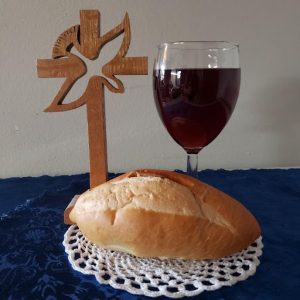
DRINKING GOD’S CUP TOGETHER
The invitation has been extended so many years ago
By God Himself to humanity He created and continues to create each and every day;
It is an invitation to come and walk with Him in this world
So, when our last step here is taken, the next step will be our entrance into eternal glory.
God took the first step so many years ago
He sent His one and only Son as a baby, born into humanity,
He grew as a child experiencing life as a refugee,
Then growing and living within a community and even traveling to Jerusalem for the Passover celebration –
He grew into adulthood and then He was commissioned to teach –
To reveal to the world a new beginning, a new way of getting to know and follow God.
He chose twelve men to teach and train more deeply,
Yet we know others were also profoundly affected
Such as Mary, Martha, Lazarus as well as the many who were healed.
And then there were the final hours before He was crucified –
He explained – His physical body would be broken, beaten and bruised like grain is before it becomes bread to sustain physical life;
His blood – which is the essence of physical life – would run from His physical wounds as juice runs from the fruit to sustain life;
Jesus died physically…..
BUT PRAISE GOD
Jesus came back to life spiritually…..
So today as people we celebrate all over the world,
This wonderful gift of life for our spiritual beings –
By remembering this wonderful gift Jesus gave to us all
Two thousand years ago.
It is a gift that unites all of us worldwide into one family,
GOD’S FOREVER FAMILY!
PRAISE BE TO GOD THE FATHER,
PRAISE BE TO GOD THE SON,
PRAISE BE TO GOD THE HOLY SPIRIT,
THE GREAT THREE IN ONE.
AMEN AND AMEN.
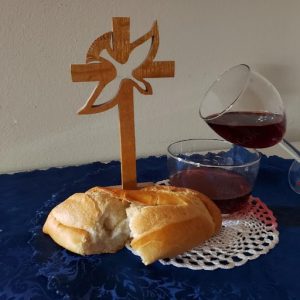
The Spirituality of Gardening Online Course is available for 180 days of access for only $39.99. This interactive course includes video sessions with Christine Sine as well as 8 other guest gardeners. Visit our store page for more information.
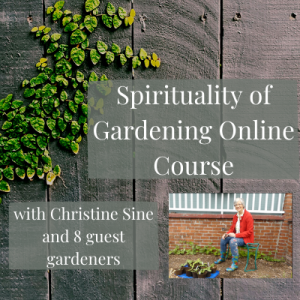
As an Amazon Associate, I receive a small amount for purchases made through appropriate links.
Thank you for supporting Godspace in this way.
When referencing or quoting Godspace Light, please be sure to include the Author (Christine Sine unless otherwise noted), the Title of the article or resource, the Source link where appropriate, and ©Godspacelight.com. Thank you!

